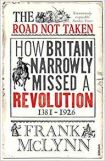The Road Not Taken: How Britain narrowly missed a revolution by Frank McLynn
| The Road Not Taken: How Britain narrowly missed a revolution by Frank McLynn | |
|
| |
| Category: History | |
| Reviewer: John Van der Kiste | |
| Summary: A solidly-researched account of the seven occasions since the Norman conquest on which Britain has come close to revolution, from the Peasants' Revolt of 1381 to the General Strike of 1926. | |
| Buy? Yes | Borrow? Yes |
| Pages: 610 | Date: July 2012 |
| Publisher: Bodley Head | |
| ISBN: 9780224072939 | |
|
| |
Since the Norman conquest, there have been no successful invasions of Britain. Yet according to this book, during that era the country has come close to revolution on seven occasions. These were the Peasants' Revolt of 1381, Jack Cade's rebellion of 1450, the Pilgrimage of Grace in 1536, the English Civil War in the 1640s, the Jacobite rising in 1745-6, the Chartist Movement of the early Victorian era, and finally the General Strike of 1926. In each case, social turbulence threatened the status quo but went no further. Why and how did they ultimately fail?
In his introduction, McLynn examines the potential for, or more accurately a discussion of the loose talk concerning, the dangers of revolution in events within living memory such as the miners' strike of 1984, the Poll Tax riots of 1990, and more recently still the English riots of summer 2011. In the last of these, any potential was exacerbated by the near collapse of the world financial system. Maybe ominous parallels can be seen between this and the twin blows to an admittedly far less developed economic system in the fourteenth century, the Black Death and the escalating costs of the hostilities with France (subsequently known as the Hundred Years' War), exacerbated by the Poll Tax and culminating in the Peasants' Revolt. This was a seismic event in British history, and the threat receded after the slaying of its leader Wat Tyler, but only after several figures in authority had been killed and much property destroyed first.
Though there were parallels between this and the situation in 1450, Jack Cade's revolt proved less of a threat and more of a briefly worrying disturbance. Cade might have had the charisma and the worthy aims of bettering the lot of the ordinary man and woman, but soon began to display delusions of grandeur and was unable to control his forces. It never posed a serious danger to authority in the same way as the Pilgrimage of Grace almost a century later. Basically a religious movement driven to militancy by the more repressive aspects of the Reformation and Thomas Cromwell's dissolution of the monasteries, its leaders had the authorities on the ropes at one stage, yet they were too poorly organized and badly coordinated to follow through their objective. In discussing the events and personalities involved, the author has some interesting comments to make on 'bluff King Hal' or Henry VIII, to whom he considers historians have always been absurdly kind. On some counts, he maintains that the second Tudor King, or 'the English Nero', who is estimated to have executed 72,000 people during his reign, was the most despicable human being who ever lived, leaving even Lenin, Stalin and Hitler in the shade. Now there's an idea for a debate on TV, perhaps.
Once we reach the seventeenth century onwards, there is more documentary evidence available for a discussion of Oliver Cromwell and the Civil War, and the subsequent quasi-revolutionary episodes in the book. The republic proved no more than a brief interruption before the restoration of Charles II turned the clock back, though the would-be revolutionaries underestimated the conservatism of the Lord Protector, and had the Levellers and Diggers succeeded in taking control of the army, England might well have experienced true revolution. The Jacobite rebellion was a classic example of a venture in which the leader hesitated, began to doubt the strength of his support, and lost his nerve at the crucial moment. Just under a century later, the Chartist movement had its roots in the radical movements of the later Hanoverian era, particularly the campaign for universal male suffrage and the savage military suppression of demonstrators at what is remembered as the Peterloo massacre. However the Chartist leaders' cause, reasonable though their objectives were, was undermined not only by infiltration by government spies but also by their ready ability to fall out among themselves.
The General Strike differed from the six previous events in that none of the radicals at the heart of the movement had serious revolutionary aims, although one might have been forgiven for thinking so as a result of government paranoia at the time, which tended to over-dramatise the situation with its dire warnings about imminent red revolution. Personalities on both the government and union side are shrewdly analysed, with the sometimes duplicitous Prime Minister Stanley Baldwin controlling the situation largely through a tamed BBC, yet occasionally having to rein in the hotheaded Winston Churchill, then Chancellor of the Exchequer, who over-reacted to the situation and inveighed against strikers as the enemy in their midst. Although McLynn does not appear over-enamoured with the institution of monarchy throughout these pages, he does give George V all due credit for urging moderation and conciliation on both sides.
This book covers the subject in great depth. McLynn's scrutiny of events and their severity on what might be seen as a Richter scale of anarchy is more than worthwhile, and his concluding chapter on revolutions, the failure of Marxism in Britain and what he sees as the Labour party's drift from socialism to social democracy and eventually a neo-liberal party, is sound. Even so I found the style and especially the lengthy paragraphs – frequently over a page of fairly close print – a little heavy-going in places. Nevertheless this only detracts marginally from an impressively researched and thoroughgoing work.
If this approach to history appeals then you might enjoy I Wish I'd Been There: Twenty Historians Revisit Key Moments in History by Byron Hollinshead and Theodore K Rabb (editors)
Please share on: ![]() Facebook,
Facebook, ![]() Twitter and
Twitter and
![]() Instagram
Instagram
![]() You can read more book reviews or buy The Road Not Taken: How Britain narrowly missed a revolution by Frank McLynn at Amazon.co.uk Amazon currently charges £2.99 for standard delivery for orders under £20, over which delivery is free.
You can read more book reviews or buy The Road Not Taken: How Britain narrowly missed a revolution by Frank McLynn at Amazon.co.uk Amazon currently charges £2.99 for standard delivery for orders under £20, over which delivery is free.
![]() You can read more book reviews or buy The Road Not Taken: How Britain narrowly missed a revolution by Frank McLynn at Amazon.com.
You can read more book reviews or buy The Road Not Taken: How Britain narrowly missed a revolution by Frank McLynn at Amazon.com.
Comments
Like to comment on this review?
Just send us an email and we'll put the best up on the site.


